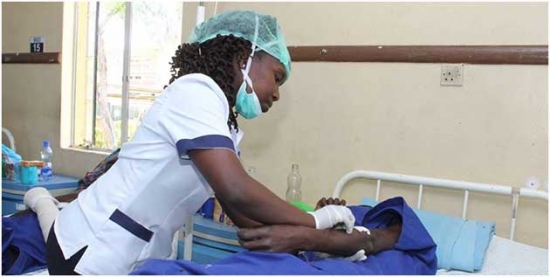The Ghana Health Service (GHS) has set a goal of attaining at least an 80 per cent coverage of citizens having access to essential health services.
Having finalized its Universal Health Coverage (UHC) roadmap, the service deems it necessary to ensure optimum coverage with respect to health for Ghanaians.
The Director of Policy, Planning and Evaluation Division of the Ghana Health Service (GHS), Dr Mrs Alberta Biritwum-Nyarko explained that, the UHC’s key objectives include increased access to better managed quality primary healthcare services.
In a speech read on her behalf to commemorate the World Universal Health Coverage Day by the Alliance for Reproductive Health (ARHR), she said that the UHC seeks universal access to interventions, reduce avoidable maternal, new-born and child adolescent deaths and disabilities as well as universal access to clinical and public health emergencies.
Dr Biritwum–Nyarko posited that, the UHC roadmap showed the commitment of government and the people to shape the future of health care in the country from 2020 to 2030.
“Ghana showed its commitment to the implementation of the UHC roadmap by developing Prioritized Operation Plan (POP) to serve as the basis for the determination of the health sector priorities and health investments for 2021 to 2030.”
She explained that the POP constituted a set of prioritised high impact services and health financing systems, and the need to strengthen reforms to accelerate progress of achieving the UHC results.

She then lauded the role of the Community-Based Health Planning and Services (CHPS) compounds saying they have become a cornerstone of health systems improvement in Ghana, serving as the first point of call.
“CHPS contribution to arterial coverage has seen a surge at the national level since 2016 and this will be attributed to the recorded increase in CHPS functionality owing to the availability of Midwives at CHPS Zones.”
She further disclosed that, another key strategy the country had adopted towards achieving UHC was the implementation of the National Health Insurance Scheme that protected people from catastrophic health costs.
“These proven interventions contributed to the steady decline in the total number of maternal deaths and institutional maternal mortality from 151.1 per 100,000 live births in 2016 to 117.6 per 100,000 live births in 2019.”
Despite the country’s achievement, she said Ghana faced the extra burden of diseases including the high prevalence of communicable and preventable diseases, undernutrition and poor levels of productive health.
Dr Biritwum–Nyarko said non-communicable diseases such as obesity, diabetics, cancer, hypertension, and cardiovascular diseases were a major cause of morbidity and mortality.
The Colloquium to commemorate the World Universal Health Coverage Day by Alliance for Reproductive Health (ARHR) in Accra was on the theme: “Achieving UHC to Protect Everyone in Ghana: What is left to be done.”
The event attracted members from Civil Society Organisations, officials from the GHS, Ministry of Health and National Health Insurance Authority.
The stakeholders reflected on Ghana’s actions and work towards UHC as well as brooding on lessons learned from different perspectives by stakeholders on how to tackle outstanding gaps slowing progress of UHC.




















